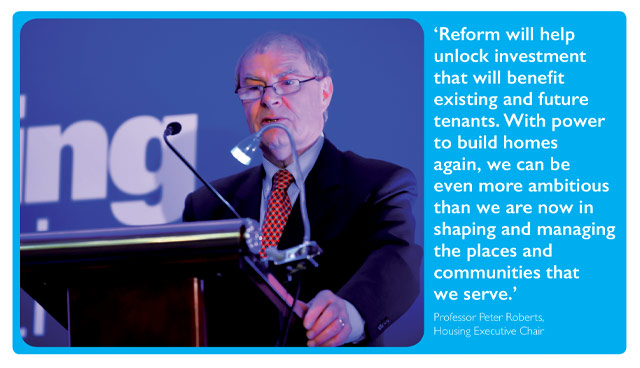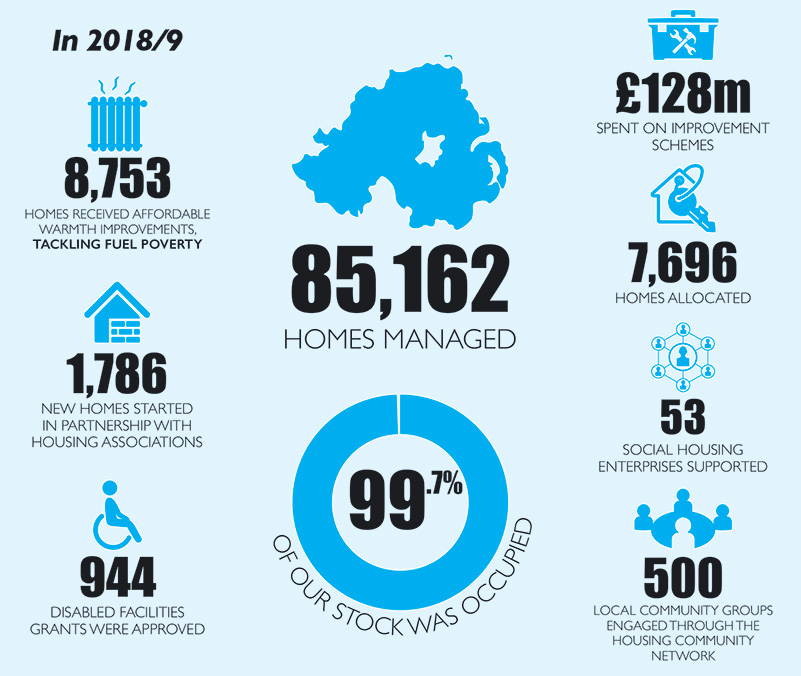“Urgent need to reform how social housing is delivered in Northern Ireland“

Professor Peter Roberts, Chair of the Housing Executive, shares the successes of the strategic housing authority over the last year and outlines its aspirations for the future.
The Housing Executive has a very proud history as a housing organisation and a public sector body in Northern Ireland.
Our core obligations to the citizens of Northern Ireland are to provide good quality homes, excellent housing services, tailored support and sustainable neighbourhoods.
We remain one of the largest social housing landlords in the UK, managing around 85,900 homes. We continue to match and outperform many other providers in terms of rent collection, tenant involvement and customer feedback.
Much of our work supports tenants beyond their front doors through our provision of financial advice, tackling antisocial behaviour, encouraging community involvement and cohesion, promoting social enterprise and enabling neighbourhood development.
We continue to administer over £600 million in Housing Benefit to tenants in the social and private sectors, as well as assisting tenants affected by the Social Sector Size Criteria and those who are now claiming Universal Credit.
In our role as the housing authority for Northern Ireland we deliver a wide range of functions alongside the Department for Communities, housing associations, the voluntary sector and other organisations.
These functions have a positive impact on many households and communities. During the last year some 20,000 vulnerable people were assisted through Supporting People funding.
Last year, we oversaw the new build programme complete 1,682 new social homes, meaning we have now enabled 15,000 homes to be built over the last 10 years. We offered support and guidance to tenants, as well as providing a range of housing options to an increasing number of households who are homeless or in housing stress.
Through our Regional Services, the strategic enabling and delivery side of the business, we provide a range of services including assessing housing need, helping those who find themselves homeless, managing the Social Housing Development Programme for new social homes with our Housing Association partners, Supporting People Services and the provision of Private Sector Grants.
Alongside this we undertake an extensive research programme to produce a comprehensive body of housing market intelligence to help us identify and determine how best to shape our services and the places where people want to live in Northern Ireland. In addition, we are the Home Energy Conservation Authority for Northern Ireland.
The Housing Executive has also engaged with all of the councils regarding our Housing Investment Plans. These plans are an important element of community planning, involving consultation from a range of stakeholders in the sector.
Housing Investment Plans are an important component of each of the Community Plans. We have aligned the plans to each Community Plan to show how our work supports the work of the council and we look forward to contributing to shaping the future of housing in each council area with our Community Planning partners.
There are a number of key issues which the Housing Executive and the housing sector face immediately and I believe we are well placed to deal with the majority of them.
However, there are other wider, crucial issues for housing in Northern Ireland which need to be addressed as soon as possible. Decisions need to be made to ensure that we are equipped to provide decent housing and sustainable communities for future generations, and this long-term strategic objective is central to our work.
We will continue to work alongside the Department for Communities to make progress with the implementation of the Social Housing Reform Programme. The most immediate requirement is to lever-in £7 billion of funds over the next 30 years to ensure that the Housing Executive’s homesremain fit to live in.
The alternative would be that the Housing Executive would have to begin to disinvest in its homes and, therefore, some of our stock would become uninhabitable.
It is our view that reform will help to unlock investment that will benefit our existing and future tenants. With power to build homes again, the Housing Executive can be even more ambitious than it is now in shaping and managing the places and communities that we serve.
Aligned to this, is the need to make urgent decisions on the future of our tower blocks. The position of the Housing Executive Board is that many of the blocks should be decommissioned over a period of time and that a comprehensive programme to re-provision homes alongside a wider regeneration plan for each neighbourhood should be put in place.
These plans should be prepared in a way that allows the local community to help to shape its future. We are now seeing the highest levels of homeless households and those in housing stress in Northern Ireland since the formation of the Housing Executive in 1971.
Our specialist teams together with colleagues across the housing sector, local representatives and community groups, are dealing with an increasing number of people in poverty, who are not only struggling to pay housing costs. But also to provide other essentials. We are also dealing with increasing numbers of individuals with mental health problems and those with addictions who require long term housing and associated support.
The need for a strong, strategic housing authority is as great as ever. We are reaching a point when many of the successes in housing, provided not only by the Housing Executive, but also our colleagues in housing associations and the wider housing community, could end or be lost.
There is an urgent need to reform how housing is delivered in Northern Ireland. This will allow us to build on the success of the past five decades and to ensure that our communities are sustainable, now and in the future.
The Housing Executive’s annual report can be found online here:
www.nihe.gov.uk/About-Us/Our-Mission-Vision/Our-annual-reports






